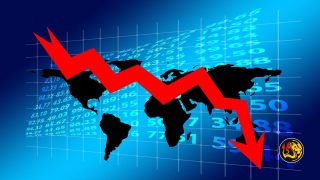
by Stefan J. Bos, Chief International Correspondent Worthy News
NEW YORK/BEIJING/BUDAPEST (Worthy News) – Major stock indexes sank in Asia Wednesday, and similar moves were due in Europe as U.S. President Donald J. Trump’s eye-watering 104 percent tariffs on China took effect.
He also imposed more tariffs on nearly 100 other nations, hiking U.S. duties to the highest level since before World War II and sparking a race among many targeted nations to renegotiate terms of trade with the U.S.
Within an hour of the tariffs taking off, a savage selloff in Treasuries sparked fears foreign funds were fleeing U.S. assets.
The U.S. dollar fell against safe-haven currencies, but the Chinese yuan hovered just above the lowest level since late 2007 as Beijing allowed the currency to depreciate further, making its products cheaper amid the sharp escalation in what seemed an all-out trade war with the U.S.
The pain is likely to spread to Europe, too, with the EUROSTOXX 50 futures index pointing to a 3.7 percent drop in the stock market.
Both S&P 500 futures and Nasdaq futures predicted that stock prices would drop by 1.6 percent.
Few assets were spared recession fears engulfing markets, with oil prices diving almost 4 percent.
TRUMP LEVIES
The levies are part of what Trump has called his reciprocal tariff regime, which targets nations his administration considers bad trade actors.
Many Southeast Asian nations were hardest hit, with Vietnam, Laos, and Cambodia receiving tariff hikes of over 45 percent. China will receive an 84 percent tariff hike, putting Trump’s tariffs on all Chinese imports at 104 percent.
Including levies on certain products from before Trump’s second term, the average tariff rate on China is estimated at around 125 percent.
Trump’s team has said that countries may be able to negotiate lower tariffs by decreasing their duties and ending non-tariff barriers on U.S. goods, but no deals have yet been reached.
Amid signs of an escalating global trade war, New Zealand’s central bank lowered interest rates, making it one of the first central banks to respond to the economic threat.
On Wednesday, the Reserve Bank of New Zealand brought its official cash rate to 3.50 percent from 3.75 percent and left the door open to further cuts “as the extent and effect of tariff policies become clearer.”
It said the Trump administration’s trade policies could slow global growth soon.
However, U.S. Federal Reserve Chair Jerome Powell said last week that America’s central bank doesn’t need to rush to lower rates. He indicated that a cut isn’t on the table at its May meeting and that the Fed would know more “as the months go by.”
Copyright 1999-2026 Worthy News. This article was originally published on Worthy News and was reproduced with permission.
Latest News from Worthy News
Anti-ICE protests continued in Minneapolis over the weekend, resulting in dozens of arrests by local law enforcement.
Authorities across North Africa and southern Europe remained on high alert Monday after powerful storms killed numerous people and forced the evacuation of more than 160,000 residents.
Ukraine’s foreign minister has warned that intensified Russian attacks on his country’s energy infrastructure are creating a direct risk of a nuclear incident that could affect all of Europe.
Official results confirmed Monday that Socialist Party candidate António José Seguro won Portugal’s presidential election with 66.7 percent of the vote, defeating André Ventura of the right-wing nationalist Chega (“Enough”) party.
Despite what advocates describe as decades of persecution, discrimination, and insecurity, Pakistan’s Christians remain steadfast in their faith and committed to peaceful coexistence, a leading Christian rights advocate said Friday.
Pakistani Christians on Friday condemned a suicide bombing during weekly prayers at a Shiite mosque on the outskirts of Islamabad that killed at least 31 people and injured 169 others in what officials described as the deadliest attack on Pakistan’s capital in more than a decade.
A single citizen tip ignited Operation Reclaim and Rebuild, a sweeping, week-long human trafficking operation that rescued nearly 20 children, uncovered residential brothels, and led to more than 600 arrests across California, authorities said this week.







